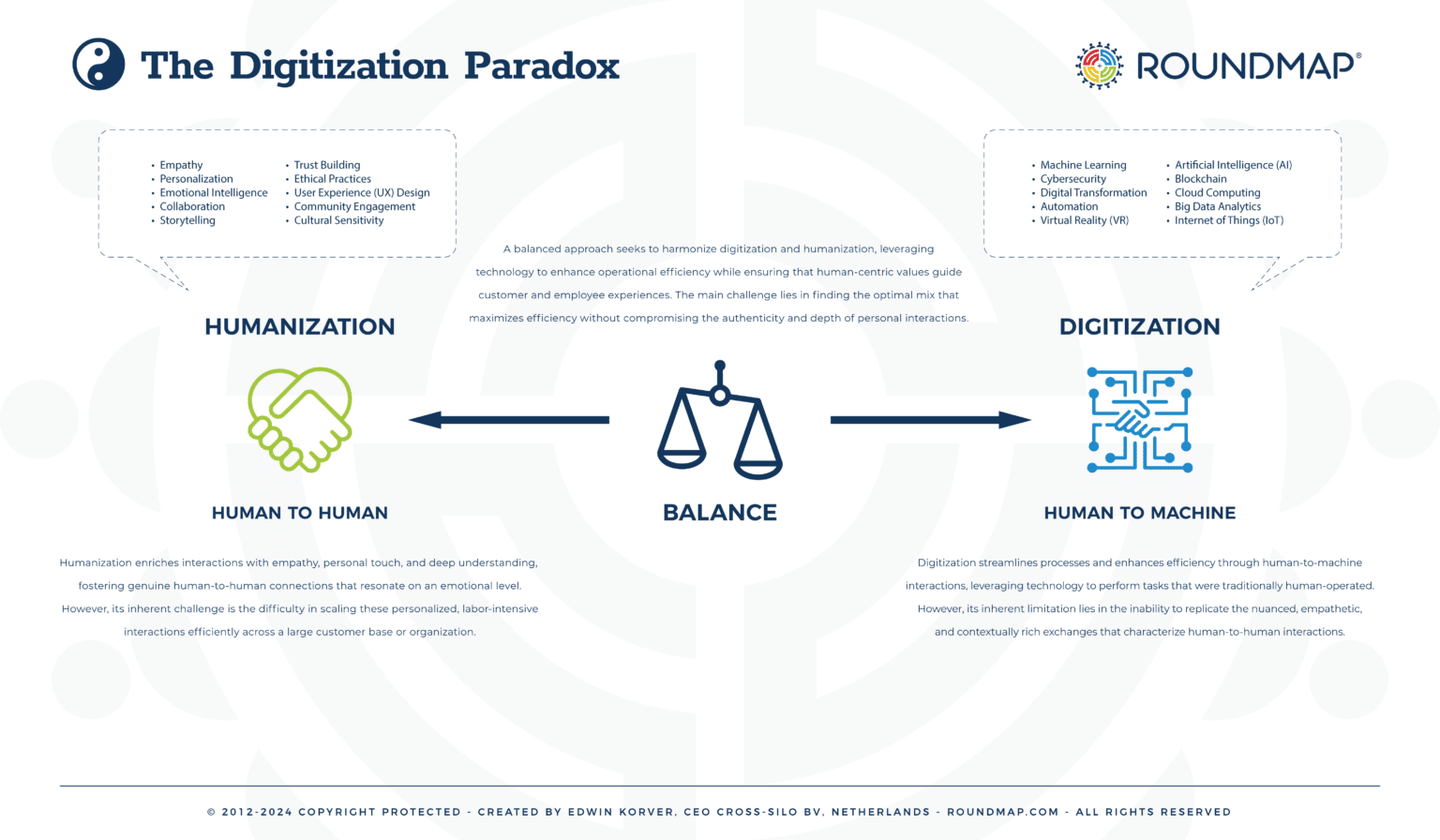The digitization versus humanization paradox captures a critical tension organizations face when navigating the modern business landscape. This paradox arises from the simultaneous need to embrace digital technologies to enhance operational efficiency, reach, and innovation while recognizing the importance of human elements—such as empathy, creativity, and personal connection—crucial for meaningful customer experiences and employee engagement.
The question to ask is: “How can we embrace the advancements of digitization and artificial intelligence without losing the essence of human connection in our business practices?”
Digitization: The Drive for Efficiency and Innovation
Digitization represents the incorporation of digital technologies into all areas of a business, fundamentally changing how operations are conducted and how value is delivered to customers. It encompasses everything from automation and data analytics to artificial intelligence (AI) and blockchain. The drive towards digitization is largely motivated by the quest for greater efficiency, scalability, and the ability to innovate rapidly in response to changing market dynamics.
Organizations that excel in digitization can process information more quickly, reduce operational costs, and develop new products or services at a pace that was previously unimaginable. They are better equipped to analyze market trends, personalize customer interactions, and optimize their supply chains. In essence, digitization offers a path to enhanced competitiveness and agility in a fast-evolving world.
Humanization: The Essence of Connection and Meaning
Conversely, humanization focuses on the preservation and enhancement of human-centric values and experiences within the business context. This includes fostering genuine connections, ensuring personalization in customer interactions, and valuing employee well-being and development. Humanization emphasizes the importance of creating meaningful experiences, building trust, and nurturing relationships.
In a world that is increasingly mediated by screens and automated systems, customers and employees alike yearn for authentic connections and experiences that resonate on a personal level. Organizations that prioritize humanization are able to cultivate loyalty, enhance employee satisfaction, and create a brand that stands for more than just its products or services. They recognize that beyond every digital transaction is a human being seeking recognition, understanding, and value.
Navigating the Paradox
The digitization versus humanization paradox lies in the challenge of advancing technological integration without losing sight of the human aspects that define the soul of a business. The key to navigating this paradox is not to view digitization and humanization as opposing forces but as complementary elements of a holistic business strategy.
- Integrating Technology with Empathy: Leveraging technology to enhance, rather than replace, human interactions. For example, AI can provide personalized customer service recommendations while ensuring that human support is available and accessible.
- Cultivating a Culture of Innovation and Care: Encouraging a culture that values technological innovation alongside employee well-being and development. Recognizing that a motivated, cared-for workforce is the backbone of any successful digital transformation.
- Balancing Automation with Personalization: Utilizing automation to streamline operations and free up human resources for tasks that require creativity, emotional intelligence, and personal touch.
- Embedding Human Values in Digital Experiences: Designing digital interfaces and experiences that are intuitive, inclusive, and reflective of human values, ensuring that technology serves to enhance rather than detract from the user experience.
In conclusion, the digitization versus humanization paradox presents both a challenge and an opportunity for businesses. By thoughtfully integrating digital technologies with a commitment to human values, organizations can harness the strengths of both to create a future that is not only technologically advanced but also profoundly human and connected.
Author
-
Edwin Korver is a polymath celebrated for his mastery of systems thinking and integral philosophy, particularly in intricate business transformations. His company, CROSS-SILO, embodies his unwavering belief in the interdependence of stakeholders and the pivotal role of value creation in fostering growth, complemented by the power of storytelling to convey that value. Edwin pioneered the RoundMap®, an all-encompassing business framework. He envisions a future where business harmonizes profit with compassion, common sense, and EQuitability, a vision he explores further in his forthcoming book, "Leading from the Whole."


